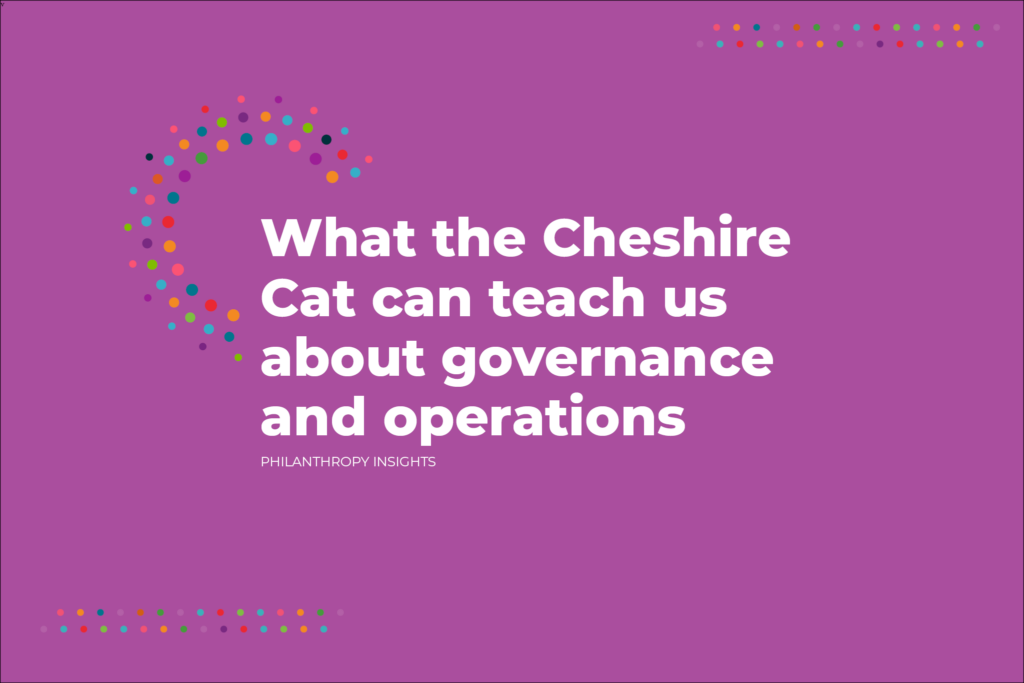Alice in Wonderland was always one of my favorite books as a child, not just because of the enchanting and whimsical fantasy world created by Lewis Carroll, but also for the surprising wisdom offered by its eclectic characters. Alice, with her childlike perspective, often found adults to be rigid and dull, seeing their actions as nonsensical. This perspective might be more accurate than we realize. How often do we as adults forget to remember the things that truly matter? In our busy lives, many of us strive to stay grounded and authentic, ensuring our actions align with our desired outcomes. This principle of aligning actions with intentions is not only important on a personal level but also crucial in the realm of philanthropy.
One of my favorite quotes is one that I often think of in my own work when Alice is lost in the wood and comes across the Cheshire cat:

“Would you tell me, please, which way I ought to go from here?”
“That depends a good deal on where you want to get to,” said the Cat.
“I don’t much care where–” said Alice.
“Then it doesn’t matter which way you go,” said the Cat.
“–so long as I get SOMEWHERE,” Alice added as an explanation.
“Oh, you’re sure to do that,” said the Cat, “if you only walk long enough.”
Being intentional in my own life, but also in areas such as strategic planning, has become a fundamental approach for me after learning the hard way. Coming from a program management and advocacy background, every strategic planning and monitoring, evaluation, and learning (MEL) trainings I ever participated in had a slide deck chock full of pictures of roads, cars, and street signs, because being clear about your intended direction is key. What’s most important and rings so true about the excerpt above is that if you simply keep moving forward, you really don’t know where you are going to end up. If, like Alice, you don’t much care where you get to, this may suffice. However, if you have a specific destination in mind, you need to establish precise goals before you can specify the strategies and activities, or path to attain these. We often talk about KPIs (Key Program Indicators) as road signs to help us know we are on the right path to achieve our aims. However, we should not forget to also define these road signs for success when we are looking at developing our operational and governance systems as well.
Whether you are working on board development and governance, internal policies, or grantmaking procedures, it is crucial that you think about what you want to achieve. You need to be intentional about our operations too, or indeed, as the Cheshire Cat says, we need to know where we want to go before, we can know which way we ought to go. We need to align our approach to operations to our strategic goals, just as we align our programmatic work.
If your destination focuses on granting to underserved populations, a burdensome application, due diligence, and reporting process may undermine your efforts. If you plan to have a board help fundraise, yet all your potential board members have the same background and run in the same circles, you may be limiting your potential reach. Just starting out? You may not need fully built-out grant management platforms and cumbersome approval processes. If your board members spend more time than intended discussing the minutia of specific program reports, you might consider lessening the level of detail in your board pre-reads.
Over the years Geneva Global has helped many clients, and we have seen operations that are based on policies, strategies, and decisions from several strategic plans ago. We have seen governance documents that were created quickly to register the organization that no longer provide the guidance needed to arrive at your ever-evolving North Star. We have helped many to update policies and procedures to better suit their current reality when they had outgrown them. Don’t forget when shifting your strategies, policies, or other guiding elements to make sure that you also have a clear destination for operational and governance changes. This will help you find the optimal route to arrive at your goals.
While the Cheshire cat may be intentionally enigmatic, your operations should not be!
